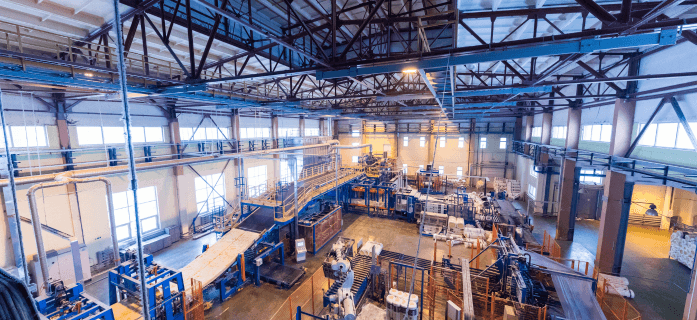LOGISTICS
5 Trends that are Reshaping the Supply Chain Industry
5 Nov 2024, 5 MINUTE READ
The logistics industry is rapidly evolving in response to technological advancements, changing consumer expectations, and global economic shifts. As we look ahead, several key trends are poised to shape the future of logistics, revolutionising the way goods are transported, warehoused, and delivered.
So, are you ready to understand these changes and seize new opportunities? Let's dive in!

Tap into Supply Chain Trends for Lasting Impact
Below are several logistics industry trends 2024 that are shaping the future.
Trend 1 - Generative AI
Generative AI (GenAI) is set to transform supply chain management, logistics services, and procurement by delivering greater efficiency and accuracy. Unlike traditional machine learning, GenAI can handle vast data sets and adapt to the unique complexities of a company's supply chain, refining its analysis over time. This allows it to optimise procurement, ensure regulatory compliance, and reduce risks in supply chain disruptions. GenAI also streamlines manufacturing by identifying inefficiencies and recommending real-time adjustments.
By 2024, 50% of supply chain organisations are expected to invest in AI-powered applications. Combined with Robotic Process Automation (RPA), GenAI can automate data entry, document processing, and order tracking, reducing delays and boosting productivity. Hence, we see that GenAI is an essential, strategic investment for companies aiming to stay competitive.
Trend 2 - Supply Chain Agility
Traditional supply chain innovations planning often falls short in today's complex multi-tiered markets. Many businesses lack the ability to conduct thorough scenario analyses to assess the financial consequences of critical decisions. This is where AI-driven solutions, such as Sales and Operational Planning (S&OP) and Integrated Business Planning (IBP), come into the picture. These tools bridge the gap between planning and execution by analysing vast datasets in real time, identifying patterns, spotting anomalies, and predicting potential disruptions. AI's ability to offer immediate solutions to these issues helps businesses respond quickly, minimise risks, and make data-driven decisions.
Trend 3 - ESG and Scope 3 Emissions
Growing concerns about ESG (Environmental, Social, and Governance) are prompting companies to focus on Scope 3 emissions, which cover all indirect emissions in the value chain, such as those from suppliers, transportation, waste, and product use. These emissions comprise the largest part of a company’s carbon footprint, making their reduction crucial.
Addressing Scope 3 emissions is the key to meeting global sustainability targets and building a more sustainable economy. It enables organisations to fulfil their ESG obligations and also helps them identify inefficiencies and promote sustainable sourcing, leading to cost savings and a stronger brand reputation.
To tackle Scope 3 emissions, companies collect primary data from suppliers and use hybrid carbon accounting methods for more accurate assessments. Digital platforms facilitate this by serving as centralised systems where suppliers can input emissions data, which is then integrated into sustainability reporting.
Trend 4 - Data Analytics and Predictive Learning
The proliferation of digital technologies in logistics, such as blockchain, IoT, and advanced tracking systems, is generating vast amounts of data daily, resulting in increased data silos and fragmented datasets. This fragmentation creates significant challenges in maintaining data quality, consistency, and usability.
To overcome these challenges. organisations must focus on data availability, quality, cadence, and consistency. Adopting a use case-driven approach is essential for proactively addressing data quality issues. By concentrating on high-impact use cases, organisations can prioritise and enhance data quality, which will yield more accurate insights and improved supply chain strategies.
Trend 5 - Electric Vehicles, Transport and Logistics
Electric vehicles (EVs) are revolutionising the transport and logistics industry, aligning with the growing emphasis on sustainability and emissions reduction. As organisations set ambitious emission targets, the adoption of EVs in logistics services is becoming more widespread. This shift is fueled by advancements in battery technology, improving the range, efficiency, and cost-effectiveness of electric trucks and vans. Future-ready transport and logistics networks are increasingly incorporating electric vehicles to replace traditional fossil fuel-powered fleets.
Summing Up
The supply chain industry is on the brink of a revolutionary shift driven by technological advancement that promises to redefine its future. Integrating advanced technologies such as artificial intelligence, blockchain, and IoT enhances supply chain transparency, efficiency, and agility. Digitalisation and automation will continue to streamline operations, while big data and predictive analytics offer distinctive insights for strategic decision-making. Sustainability will remain at the forefront, with an increasing emphasis on eco-friendly practices and circular economy principles.
These trends will reshape the supply chain industry, creating a more connected, resilient, and sustainable network. Embracing these innovations is indispensable for businesses aiming to stay ahead in a rapidly changing environment, positioning themselves as leaders in a future where agility, intelligence, and environmental goals are vital.
Contact us today for detailed insights on how Varuna Group can support your business.
Frequently Asked Questions
Q1: How are companies using data and analytics to improve supply chain resilience?+
Businesses use real-time data and predictive analytics to forecast demand, identify risks, and make faster, more informed decisions during disruptions.
Q2: What role does sustainability play in modern supply chain strategies?+
Sustainability drives eco-friendly sourcing, energy-efficient transportation, waste reduction, and compliance with environmental regulations, helping brands meet both ethical and consumer expectations.
Q3: How is AI transforming supply chain operations and decision-making?+
AI enables automated demand forecasting, route optimization, inventory management, and faster problem-solving, leading to more agile and cost-effective supply chains.
Related Insights
LOGISTICS
3PL vs 4PL: What You Need to Know to Choose the Best Option?
30 Apr 2025, 6 MINUTE READ
LOGISTICS
Understanding Integrated Logistics: Key Concepts and Advantages
10 Apr 2025, 4 MINUTE READ
LOGISTICS
How to Avoid Delays and Penalties in Road Freight Services?
3 Mar 2025, 6 MINUTE READ
LOGISTICS
Strategic Vehicle Distribution: Enhancing Accessibility Across Key Hubs
6 Jan 2025, 4 MINUTE READ
LOGISTICS
Transporting Traditions: The Logistics of Seasonality During Festivals
7 Nov 2024, 5 MINUTE READ
Drive efficiencies throughout your supply chain with our technology-enabled services
View Services